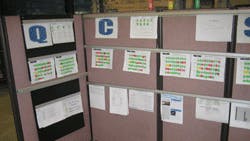Of these factors, which one plays the biggest role in a manufacturing operation's success: quality, cost, delivery, safety or morale?
Philips Respironics' Sleep Therapy manufacturing facility in New Kensington, Pa., believes the answer is "all of the above." The plant, which employs 250 people, measures all five factors in a process it calls "QCDSM."
"It truly is the backbone of our continuous improvement," Erik Kulikowski, director of North American operations for Philips Home Health Care, told a group of manufacturers who visited the plant on Sept. 24 as part of IndustryWeek's Excellence in Action Series.
QCDSM focuses on measuring and improving the five metrics through visual reminders, employee empowerment, structured reviews of progress and an emphasis on problem solving at the lowest possible level.
"It's a balanced scorecard that enables us to figure out where we need to be working on things," Kulikowski said.
QCDSM is "the systematic elimination of waste through the teamwork of all associates, engaging in continuous improvement and problem-solving activities every day," Stefanie Lozito, continuous improvement leader for Philips Home Healthcare Solutions, explained in a presentation on the process. The problem-solving tools used by the facility to meet its objectives for the QCDSM metrics include:
- Kaizen events.
- Six Sigma methodology.
- Pareto charts and error trending.
- Layered process audits.
- Human error and fault-tree analysis.
The foundation of the system is that employees are empowered to lead, communicate and suggest improvements; enabled with the right tools to make changes happen; and engaged in active participation, according to Lozito. It's a philosophy that forces managers to shift their thinking to a mindset that "no longer are we the experts and no longer can we tell people how to do their jobs," Kulikowski said.
"People want to help. We know that. We've proven it," Kulikowski said. "Don't ask them to check their brains at the door. That's the stupidest thing you could do."
While the New Kensington facility was just commissioned in August 2009, the QCDSM process is nothing new to Philips Respironics. Its nearby Murraysville, Pa., facility, which was named an IndustryWeek Best Plants winner in 2009, also uses QCDSM and has seen significant improvements in assembly errors, labor efficiency and other measurements.
At a Glance
Philips Respironics' Sleep Therapy facility
Location: New Kensington, Pa.
Start-up: August 2009
Products: Devices that monitor, treat and diagnose sleep disorders; ventilators; devices that monitor the health of newborn babies; fall detectors; medication dispensers
Employees: 250
Square feet: 172,000
Revenue per square feet: $11,000
About the Author
Josh Cable
Former Senior Editor
Former Senior Editor Josh Cable covered innovation issues -- including trends and best practices in R&D, process improvement and product development. He also reported on the best practices of the most successful companies and executives in the world of transportation manufacturing, which encompasses the aerospace, automotive, rail and shipbuilding sectors.
Josh also led the IndustryWeek Manufacturing Hall of Fame, IW’s annual tribute to the most influential executives and thought leaders in U.S. manufacturing history.
Before joining IndustryWeek, Josh was the editor-in-chief of Penton Media’s Government Product News and Government Procurement. He also was an award-winning beat reporter for several small newspapers in Northeast Ohio.
Josh received his BFA in creative writing from Bowling Green University, and continued his professional development through course-work at Ohio University and Cuyahoga Community College.
A lifelong resident of the Buckeye State, Josh currently lives in the Tremont neighborhood of Cleveland. When the weather cooperates, you’ll find him riding his bike to work, exercising his green thumb in the backyard or playing ultimate Frisbee.
